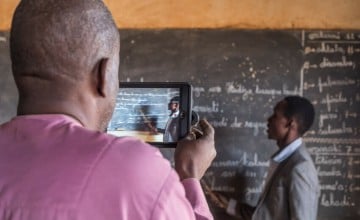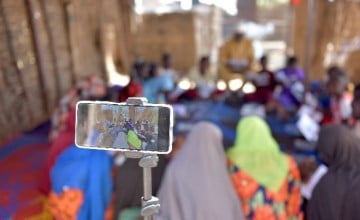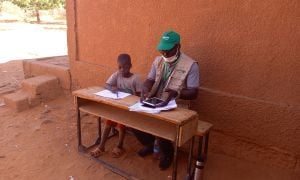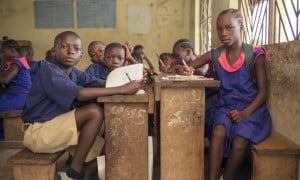
Read our 2024 annual report

Knowledge Hub
Video Coaching for Teachers: A Digital Solution for Teachers in Hard-to-Reach Schools in Niger
In recent years, the security crisis in Niger has greatly impacted the education system, especially in regions where Concern is working (Tillabéri, Tahoua and Diffa). Education is targeted by non-state armed groups with attacks, destruction of teaching materials and deterioration of infrastructure and equipment. As of April 2025, 1,032 schools were closed in the Tillabéri region alone. This has led to over 82,000 children being out of school without alternatives, finding themselves exposed to the risks of enrolment in non-state armed groups, child marriages, and various forms of exploitation.
Concern's ‘Learning Together’ programme (2020-2025) aims to support the schooling of vulnerable children in regions affected by the humanitarian crisis. Implemented in 250 schools across two regions, the programme gives children an opportunity to access quality education, thereby strengthening social cohesion and well-being.

The impact of school closures has not only affected students but also the teachers and the quality of the education they are able to provide.
Following a successful 3-month pilot phase between March and June 2022, the Learning Together programme has been implementing an innovative distance video-coaching approach, providing continuous professional development support to 164 teachers and facilitators in inaccessible areas using new information and communication technologies (including tablets, tripods and smartphones).
Concern’s video coaching approach sits in alignment with Niger’s Ministry of Education’s (MoE) Sector Plan and is implemented with Inspectors and Pedagogical Advisors from the MoE. This approach has been developed to continue supporting teachers working in formal schools that are not accessible to the Pedagogical Advisors for security reasons. It has then been extended to support facilitators from listening clubs (Concern’s distance interactive audio learning programme) in closed school zones.
This alternative form of remote continuous pedagogical development enables teachers in areas with high insecurity to continue to get much-needed routine support from their Pedagogical Advisor (PA), even and especially in difficult contexts and in turn improving the quality of teaching for children. For listening clubs’ facilitators, this also allows the MoE to be able to monitor the quality of learning received by children when schools are closed. The approach allowed 164 teachers and facilitators to adapt their practices, impacting over 7,110 pupils in highly volatile contexts.
With the help of digital tools, teachers in schools record themselves while teaching sessions. Head teachers then bring the videos to the PAs who in turn view the lessons and give feedback to teachers by message.
Specifically, this involves:
- Training all stakeholders on the ‘video coaching’ approach and how to process the film (Inspectors, PAs, headteachers, teachers, facilitators and staff from partner NGOs). The trainings are done in bigger towns nearby based on security assessments.
- Equipping them with IT tools (tablets, smartphones, tripods, USB sticks, power banks).
- Teachers film 2 lessons of 30 to 45-minutes every month (one in Maths and one in French).
- PAs make feedback, teachers and head teachers review the feedback and implement necessary improvements while documenting this though a signed follow-up sheet.
- Organising pedagogical days after each monthly remote monitoring report at school level to create a school community of practice and encourage peer-learning at school level.

As a practical alternative to the challenges of accessing schools in insecure areas, trained Inspectors and Pedagogical Advisors are currently internalising the remote pedagogical approach and its associated tools and have asked for the approach to be scaled up. This ensures the continuity of educational supervision for the benefit of teachers and students, even in difficult contexts.
Similarly, Concern developed an Interactive Audio Distance learning programme and curriculum to allow children in areas where schools had to close because of insecurity to continue learning. Children gather in a learning club with a facilitator to listen to the audio programme together. This approach is also recognised and endorsed by the MoE as the facilitators are also supported by the formal school PAs through video coaching.
Given the escalating emergency context in Niger, which can suddenly limit the ability of education actors to operate, the Ministry of Education recognises the value of strategies such as distance teacher support and distance audio learning. It offers reliable means to ensure access to and continuity of quality education for thousands of children affected by the crisis all over the country.




